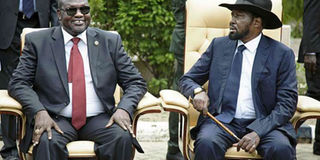Kiir and Machar have a lot of work to do but they may – unwisely – just fight again

First Vice President of South Sudan and former rebel leader, Riek Machar (left), and President Salva Kiir, sit for an official photo with the 30 members of the new cabinet of the Transitional Government at the Cabinet Affairs Ministry, in Juba on April 29, 2016. PHOTO | AFP
What you need to know:
- The President, rather than play development carrot and political stick, wielded a massive stick of exclusion.
- In July 2013, he fired his Cabinet, including Dr Machar and Mr Amum.
- That Dr Machar is an ambitious man is not in doubt; that he is an unreliable customer is clear from his history in the liberation struggle.
Dr Riek Machar is back as Vice-President of South Sudan, the post from which he was fired almost three years ago, but there is a difference.
He has his own army, part of which preceded his return to Juba from Ethiopia, and forms part of his security. And, he and President Salva Kiir just announced a broad-based and jointly newly constructed, albeit transitional, government of national unity.
When heavily armed troops stormed Dr Machar’s residence in Juba in December 2013, which action precipitated the more than two years of civil war, President Kiir accused his former VP of plotting to seize power via a military coup. Still protesting his innocence, Dr Machar went to the bush to wage war.
Who is to blame for the more than one million people displaced internally and exiled, the disruption of economic activities in Africa’s youngest nation and, crucially, the tens of thousands of non-combatant civilians killed and maimed? The UN accuses both government (Kiir) and rebel (Machar) sides of atrocities against unarmed civilians.
But what was the trigger for the civil war? Independent only since July of 2011, there were growing concerns internally and externally from South Sudanese elite that Kiir was packing ministries and departments with his tribespeople and grand corruption was already rampant in the
Tribalism and graft are powder kegs and many African capitals took note. Indeed, speculation was rife in Juba that President Kiir and Machar were often talking at cross-purposes and that the friction between the two men was cascading down to their trusted and partisan lieutenants and juniors.
Matters came to a head when Mr Pagan Amum, the Secretary- General of the governing Sudan People’s Liberation Movement (SPLM), publicly criticised Mr Kiir’s leadership, thus giving voice to the covert discontent over job placement, poverty alleviation programmes, and slow infrastructure development, among others.
President Kiir should have seized the moment and moved to streamline the operations of government and make it inclusive, introduced measures to hasten development programmes and empowerment of the various peoples that make up South Sudan. More importantly, he should have created a big political tent.
The President, rather than play development carrot and political stick, wielded a massive stick of exclusion. In July 2013, he fired his Cabinet, including Dr Machar and Mr Amum.
But the VP and Mr Amum, who headed the critical oil and security talks with Khartoum, were the real targets of Mr Kiir’s explosive gladiatorial action.
LIBERATION STRUGGLE
It was a miscalculation. That Dr Machar is an ambitious man is not in doubt; that he is an unreliable customer is clear from his history in the liberation struggle. Mr Kiir knew these facts. Dr Machar was not going to incite disfavour for the government; it already existed, but having been ejected, he was not going to discourage it.
His predicament at the hands of the President was incitement enough. Mr Kiir had hoped that by dismissing his Cabinet, Dr Machar and Mr Amum would move swiftly to form a rival party but they did not. Six months down the line and amid heightened tensions came the coup move and all-out war.
I doubt that Kiir underestimated the ability of Machar to mobilise against the government, the support he would muster among disaffected SPLM cadres and the depth of tribal resentment his ejection from government would elicit among his people. I rather think he unwisely banked on swiftly defeating Machar militarily.
In the event, he failed. Similarly, Machar did not score an outright military victory. There was no victory in sight for either side as both oscillated between defeat and victory in battle after battle and as various peace initiatives and internal and external pressure mounted on the sides to sue for peace.
In February all changed again as Juba agreed to a peace deal in which both sides would form a government of national unity and hold elections after 30 months. Mr Kiir then appointed Mr Machar VP. That is why he was returning home last week to be sworn in and, with the President, embark on constructing a new government.
Ultimately, both men have blood on their hands, but the President doubly so for his follies of commission and omission. Dr Machar has scored a blood-stained victory over Mr Kiir because he is back as VP and Mr Kiir has eaten humble pie by having him back. Both have a lot of work to do but they may – unwisely – just fight again.





